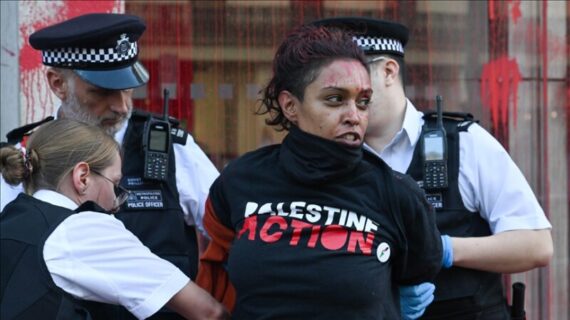On July 2, 2025, the UK House of Commons overwhelmingly approved a motion to designate Palestine Action as a terrorist organization, with 385 MPs voting in favor and just 26 against. The decision was subsequently endorsed by the House of Lords on 3rd July. As a result, the proscription officially came into effect on 5th July, making it a criminal offence to support or be associated with the group under UK law.
Following the designation, the Metropolitan Police updated their official news site with a public statement, titled “Update on policing in London following proscription of Palestine Action.” The statement reads:
“Palestine Action has now been proscribed by the UK Government and expressing support for them is a criminal offence in the UK. There are a number of events taking place in London this weekend, and anyone attending should be aware that officers policing these will act where criminal offences, including those related to support of proscribed groups or organisations, are committed.”
The proscription, under the Terrorism Act 2000, grants police additional powers to intervene where individuals or groups are seen to be endorsing or facilitating a proscribed organization.
The Road to Proscription: From Warnings to Crackdown
Talks of proscribing Palestine Action have been circulating in government circles since late 2023, as the group’s high-profile actions escalated. Their direct-action campaigns, including the occupation of Elbit Systems sites in Leicester and Bristol, and the targeting of weapons factories and offices connected to the Israeli arms trade, drew both media attention and condemnation from officials.
As public support for Palestine surged amid Israel’s escalating military operations in Gaza, government ministers began signaling a harder line. In October 2023, then-Home Secretary Suella Braverman sharply criticized pro-Palestine demonstrations, branding them “hate marches.” She drew no distinction between peaceful protesters and violent ones, stating: “To my mind, there is only one way to describe those marches, they are hate marches.”

VIDEO: The UK High Court upholds Palestine Action ban amid London protests
Who Are Palestine Action and Why Are They Targeted?
To understand the gravity of the UK government’s recent decision to proscribe Palestine Action, it’s important to consider who the group is and why it has been targeted.
Founded in 2020, Palestine Action is a direct-action network known for its disruptive protests against British complicity in Israel’s military operations, particularly through targeting Elbit Systems UK, a major arms manufacturer supplying drones and weapons to the Israeli military.
The group’s tactics include occupying factory rooftops, damaging equipment, and defacing buildings with red paint to symbolize Palestinian blood. While these methods are confrontational, they are non-violent. Supporters argue the actions are a necessary form of civil disobedience to expose and disrupt what they describe as the UK’s role in human rights abuses in Gaza.
The U.K. government’s move to proscribe Palestine Action came shortly after activists breached a Royal Air Force base in Brize Norton, Oxfordshire, on the 20th June. Members of the group damaged two military aircraft, in which the Police estimated that the damage caused by the incident amounted to approximately £7 million.
Recommended
The incident marked a sharp escalation in the group’s direct-action tactics and appears to have been a key trigger for the government’s decision to invoke terrorism legislation.
Palestine Action does not use weapons or target civilians; instead, it targets corporate infrastructure linked to international conflict, a distinction now at the heart of a contentious national debate.
The Public Pushback: What’s at Stake?
Since the ban on Palestine Action took effect, the Metropolitan Police, also known as the Met Police or the Met, which is the territorial police force responsible for law enforcement and crime prevention within Greater London, has cracked down on public displays of support for the group. In Parliament Square, Met Police officers arrested over 20 demonstrators, many holding placards reading: “I oppose genocide. I support Palestine Action.”
Key developments include:
- 29 protesters have been arrested on suspicion of terrorism offences.
- The group was officially proscribed as a terrorist organization after a last-minute legal challenge to delay the ban at the Court of Appeal failed.
- Palestine Action now joins a list of banned organisations including al-Qaeda, ISIS (Daesh), and Hezbollah.
- Membership or support for the group is a criminal offence, punishable by up to 14 years in prison.
- Even wearing a T-shirt or badge with the group’s name can result in a maximum six-month prison sentence.
Among those arrested was Reverend Sue Parfitt, aged 83, an emblematic figure of the broad crackdown.
Leslie Tate, a 76-year-old Green Party councilor, condemned the ban as “the creeping edge of totalitarianism” and called the protests “necessary to defend our democracy.”
Read: Gaza and Trump 2.0
What does this mean for future activism in the UK?
The proscription of Palestine Action is not an isolated event but part of a broader democratic challenge facing the UK. Growing emphasis on security concerns is increasingly influencing political discourse, sometimes at the expense of fundamental civil liberties.
Democracies depend on dissent, protest, and the freedom to question authority. When protest is criminalized, the balance of power can shift away from citizens toward the state.
Critics caution that equating disruptive but non-violent activism with terrorism risks blurring vital democratic boundaries.





